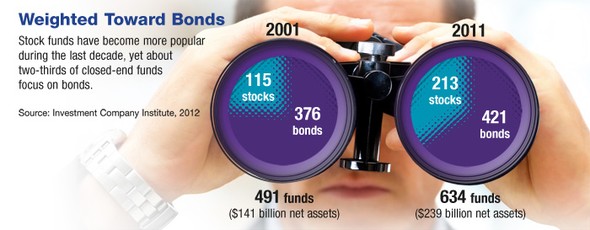A Closer Look at Closed-End Funds
As an investor, you probably own mutual funds and have an understanding of how they work. However, you may not have considered that the vast majority of mutual funds are open-end funds that don’t restrict the number of shares but rather issue and redeem them in response to investor demand.1
You might want to expand your knowledge — and perhaps your portfolio — by learning more about less common closed-end funds. At the end of 2011, there were 7,637 open-end mutual funds in the United States and only 634 closed-end funds.1
A Limited Offering
A closed-end fund issues a fixed number of shares in an initial public offering (IPO), and the fund managers use the IPO proceeds to purchase investments that reflect the fund’s stated objectives. The fund is then listed on an exchange and traded on the secondary market, similar to a stock, and transactions typically incur a brokerage commission. Although a fund may issue additional shares in a subsequent offering, this is uncommon, and shares are generally not repurchased or redeemed by the fund.
The price of a closed-end fund can change throughout the trading day, like a stock, due to supply and demand. Depending on the market, the price could be higher or lower than the net asset value (NAV) of the underlying investments. When this occurs, the fund is said to be trading at a premium or discount, respectively. By contrast, open-end mutual funds are generally priced once daily at the end of the trading day, and the price is based directly on the NAV.

Closed-end funds may hold stocks, bonds, and other types of underlying investments. Unlike open-end funds, however, closed-end funds do not need to maintain cash reserves or sell securities to meet redemptions, so the fund has the flexibility to invest in less liquid securities. Closed-end funds also may borrow against their assets, subject to certain limitations, allowing them to use leverage as part of their investment strategy. This can make the funds more volatile and involves additional investment risk.
Both open-end funds and closed-end funds are professionally managed and charge management and other fees. The return and principal value of all mutual funds fluctuate with changes in market conditions. Shares, when sold, may be worth more or less than their original cost.
Closed-end funds are relatively sophisticated investment vehicles and may not be appropriate for everyone. If you are interested in adding a closed-end fund to your portfolio, be sure you fully understand the fund’s objectives and underlying investments.
Mutual funds are sold by prospectus. Please consider the investment objectives, risks, charges, and expenses carefully before investing. The prospectus, which contains this and other information about the investment company, can be obtained from your financial professional. Be sure to read the prospectus carefully before deciding whether to invest.
1) Investment Company Institute, 2012
The information in this article is not intended as tax or legal advice, and it may not be relied on for the purpose of avoiding any federal tax penalties. You are encouraged to seek tax or legal advice from an independent professional advisor. The content is derived from sources believed to be accurate. Neither the information presented nor any opinion expressed constitutes a solicitation for the purchase or sale of any security. This material was written and prepared by Emerald. Copyright © 2013 Emerald Connect, Inc.

